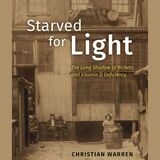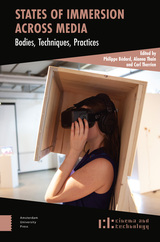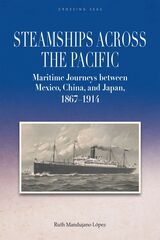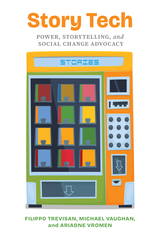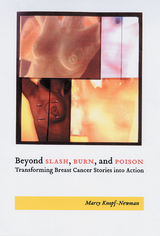
Depending on one’s vantage point, breast cancer can be a very different experience, and indeed, a very different concern. It is, for some, a personal struggle; for others, it is a disease posing scientific and environmental challenges; and for others it is a highly charged and politicized issue around which policy wars rage. Beyond Slash, Burn, and Poison brings a unique perspective to breast cancer by recognizing the overlapping relationship of all these realities.
Drawing on the writings of Rachel Carson, Betty Ford, Rose Kushner, and Audre Lorde, this book explores the various ways in which patient-centered texts continue to leave their mark on the political realm of breast cancer and, ultimately, the disease itself. Ordered chronologically, the selections trace the progression of discussions about breast cancer from a time when the subject was kept private and silent to when it became part of public discourse. The texts included are personal accounts, written by women struggling to play an active role in their healing process and, at the same time, hoping to help others do the same.
Knopf-Newman also shows us how these writings eventually changed public opinion and the underlying tendency to blame women for their illness. She argues that changes in medical practice and public policy are linked to textual interventions, and makes a case for the politicization of cultural studies of disease through personal and literary expression.
Passionately written and well-researched, Beyond Slash, Burn, and Poison transforms how we think about breast cancer. Rather than facilitating forums for separate discussions, this book brings conversations into dialog with each other. It is essential reading for anyone concerned with breast cancer and its history, as well as for those interested in the effect of the environment on public health and the role that literature plays in public policy and medicine.
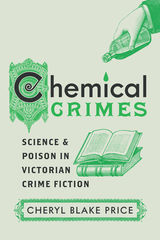
From the Newgate and Silver Fork novels of the 1830s to the emergent genres of science and detective fiction of the 1890s, Price advocates for the classification of a new type of poisoner, one who combined crime with methodical scientific know-how: the chemical criminal. Chemical Crimes shows how authors used the subversiveness of chemical crimes to challenge the supposed disciplinary force of forensic detection and suggests that generic developments were inspired as much by criminal scientific innovation as they were by the rise of the detective–scientist. By focusing on chemical crime’s appearance at significant moments, this book traces how reactions to Victorian science inspired change in nineteenth-century crime fiction.
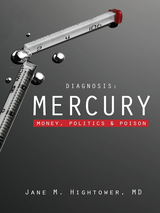
Dr. Hightower’s quest for answers led her to mercury, a poison that has been plaguing victims for centuries and is now showing up in seafood. But this “explanation” opened a Pandora’s Box of thornier questions. Why did some fish from supermarkets and restaurants contain such high levels of a powerful poison? Why did the FDA base its recommendations for “safe” mercury consumption on data supplied by Saddam Hussein’s Ba’athist extremists? And why wasn’t the government warning its citizens?
In Diagnosis: Mercury, Dr. Hightower retraces her investigation into the modern prevalence of mercury poisoning, revealing how political calculations, dubious studies, and industry lobbyists endanger our health. While mercury is a naturally occurring element, she learns there’s much that is unnatural about this poison’s prevalence in our seafood. Mercury is pumped into the air by coal-fired power plants and settles in our rivers and oceans, and has been dumped into our waterways by industry. It accumulates in the fish we eat, and ultimately in our own bodies. Yet government agencies and lawmakers have been slow to regulate pollution or even alert consumers.
Why? The trail of evidence leads to Canada, Japan, Iraq, and various U.S. institutions, and as Dr. Hightower puts the pieces together, she discovers questionable connections between ostensibly objective researchers and industries that fear regulation and bad press. Her tenacious inquiry sheds light on a system in which, too often, money trumps good science and responsible government. Exposing a threat that few recognize but that touches many, Diagnosis: Mercury should be required reading for everyone who cares about their health.
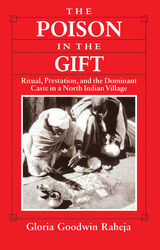
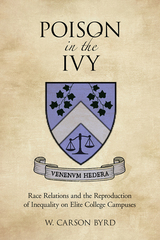
Poison in the Ivy challenges popular beliefs about the importance of cross-racial interactions as an antidote to racism in the increasingly diverse United States. He shows that it is the context and framing of such interactions on college campuses that plays an important role in shaping students’ beliefs about race and inequality in everyday life for the future political and professional leaders of the nation. Poison in the Ivy is an eye-opening look at race on elite college campuses, and offers lessons for anyone involved in modern American higher education.
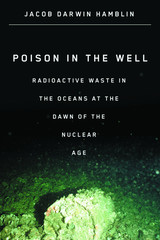
In the early 1990s, Russian President Boris Yeltsin revealed that for the previous thirty years the Soviet Union had dumped vast amounts of dangerous radioactive waste into rivers and seas in blatant violation of international agreements. The disclosure caused outrage throughout the Western world, particularly since officials from the Soviet Union had denounced environmental pollution by the United States and Britain throughout the cold war.
Poison in the Well provides a balanced look at the policy decisions, scientific conflicts, public relations strategies, and the myriad mishaps and subsequent cover-ups that were born out of the dilemma of where to house deadly nuclear materials. Why did scientists and politicians choose the sea for waste disposal? How did negotiations about the uses of the sea change the way scientists, government officials, and ultimately the lay public envisioned the oceans? Jacob Darwin Hamblin traces the development of the issue in Western countries from the end of World War II to the blossoming of the environmental movement in the early 1970s.
This is an important book for students and scholars in the history of science who want to explore a striking case study of the conflicts that so often occur at the intersection of science, politics, and international diplomacy.
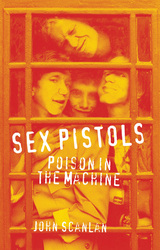
Scanlan tells the story of how McLaren’s project—designed, in any case, to fail—foundered on the development of the Pistols into a great rock band and the inconvenient artistic emergence of John Lydon. Moving between London and New York, and with a fascinating cast of delinquents, petty criminals, and misfits, Sex Pistols: Poison in the Machine is not just a book about a band, it is about the times, the ideas, the coincidences, and the characters that made punk; that ended with the Sex Pistols—beaten, bloody, and overdosed—sensationally self-destructing on stage in San Francisco in January 1978; and that transformed popular culture throughout the world.
READERS
Browse our collection.
PUBLISHERS
See BiblioVault's publisher services.
STUDENT SERVICES
Files for college accessibility offices.
UChicago Accessibility Resources
home | accessibility | search | about | contact us
BiblioVault ® 2001 - 2025
The University of Chicago Press


